2014年高考英语总复习:综合能力测试(选修七,Unit1-Unit5,含解析)
- 格式:doc
- 大小:148.50 KB
- 文档页数:24
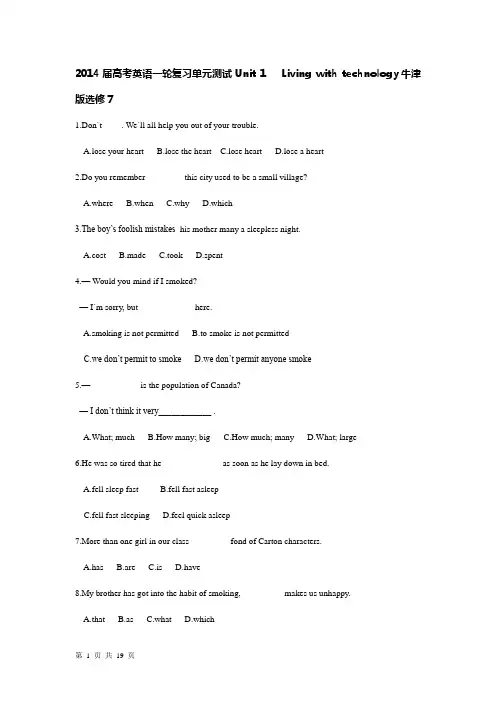
2014届高考英语一轮复习单元测试Unit 1 Living with technology牛津版选修71.Don`t ------. We`ll all help you out of your trouble.A.lose your heartB.lose the heartC.lose heartD.lose a heart2.Do you remember ________ this city used to be a small village?A.whereB.whenC.whyD.which3.The boy’s foolish mistakes his mother many a sleepless night.A.costB.madeC.tookD.spent4.— Would you mind if I smoked?— I`m sorry, but ____________ here.A.smoking is not permittedB.to smoke is not permittedC.we don’t permit to smokeD.we don’t permit anyone smoke5.—___________ is the population of Canada?—I don’t think it very____________ .A.What; muchB.How many; bigC.How much; manyD.What; large6.He was so tired that he_____________ as soon as he lay down in bed.A.fell sleep fastB.fell fast asleepC.fell fast sleepingD.feel quick asleep7.More than one girl in our class_________ fond of Carton characters.A.hasB.areC.isD.have8.My brother has got into the habit of smoking, _________ makes us unhappy.A.thatB.asC.whatD.which9.I’m afraid to build the bridge will _____ a lot of money as well as time.A.call forB.call inC.call onD.call up10.To our great surprise, the well-dressed man _______ to be a thief.A.turned onB.turned upC.turned outD.turned off11.The little girl is often listened to___________the piano by the children.A.to playingB.to playC.playD.playing12.Since everyone is here, let’s ____________ to business.A.get onB.get alongC.get upD.get down13.If you work with a stong will, you can surely overcome any difficulty, __________ great it is.A.whatB.howC.whateverD.however14. ___________no one persuading him to buy the car.A.There wasB.It wasC.Here wasD.That was15.— Can you ride a horse? —No, I never had a chance__________ .A.for learning itB.for learning howC.to learn itD.to learn how16.— May I have a talk with one of your sports reporters?— Sorry, but all of them are out to________ the main events of the day.A.getB.findC.coverD.search17.— Why does Dr Brown prefer this job?— Because he is free to do his research work _________he wants.A.any wayB.some wayC.whateverD.whichever18. ____________the film star made her mind to act in the common film?A.Why was it thatB.Was it that whyC.Why it was thatD.Was it why that19.He’s________ to know the answer. You can ask him for help.A.likelyB.probablyC.maybeD.possibly20.— When ___________ a game of football? — May 1st.A.had you lastB.did you last havest had youD.did you have last21.The police said that the fire ___________ his carelessness.A.resulted inB.resulting fromC.resulted fromD.resulting in22.I need one more coin before this collection_____________ .A.have been completedB.is completedC.has completedD.is completing23.To make more progress,_________________.A.one must work hardB.working hard is neededC.what you need is to work hardD.what one needs is to work hard24.We’re going to work in Australia teaching Chinese___________.telyB.recentlyC.likelyD.shortly25.— Can I have a talk with the director? —I’m sorry, but he’s busy______.A.for a momentB.for the momentC.in a momentD.just a moment26.Don’t expect me to ___________ after you use the room.A.clear upB.cleanC.clean and tidyD.make up27.How pleasant the picture is ____________!A.to look atB.lookihng atC.lookD.to be looked at28.The _________ can ________corn in many ways with different________ .A.cooker, cook, cookB.cook, cook, cookersC.cooker, cook, cookersD.cook, cooker, cooker29.They began to think about what such material was ____ and what use could be ____it.A.made up, made upB.made up of, made ofC.made from, made up ofD.made into, made from30.All the people present were required to______ it a secret______ the outside.A.prevent, againstB.make, offC.prevent, fromD.keep, from31.He is ____________ man whom the police____________ .A.a very, is looking afterB.the very, is afterC.the very, are afterD.just the, are after him32.We will never_________ you _________ the trouble of doing such things.A.put, toB.get, toC.put, inD.get, in33.The students required that Professor Wang ____ a lecture on chemical engineering.A.must giveB.ought to giveC.giveD.gave34.___________,she ran out of the room.A.Having tears in her eyes and turned suddenlyB.Turning suddenly, with tears in her eyesC.With a sudden turn, and tears were in her eyesD.With tears were in her eyes and turning suddenly35.You’d better ____________ your room ___________before leaving.A.get, cleaningB.get, cleanedC.to get, to be cleanedD.got, cleaned36.The meat tastes as though it ____ bad.Throw it away.A.go B.goes C.had gone D.has gone37.Seven ____ nine makes sixteen.A.added to B.adds C.added up to D.added for38.It's raining so hard.She ____ be playing on the playground.A.needn't B.may C.ought to D.can't39.Such things must ____ at once.A.put and end B.put an end to C.be put an end D.be put an end to 40.This kind of medicine will be ____ useful if you can't make it out.A.mistaken for to be B.mistaken for C.mistaken for being D.mistaken about 41.The recorder ____ where I ____ it before.A.lay;had lain B.lay;had laid C.laid;had lain D.lied;had lain 42.What has your brother done ____ the paper?A.except to read B.besides reading C.besides to read D.except being read 43.All this beautiful silk can __ wonderful cloth ___ which many kinds of new clothes are made.A.be used to weave;of B.be used to weave;toC.be used to weaving;D.used to weave to;from44.The people in that area still remain ____ poverty.A.at B.in C.from D.of45.—We haven't heard from Jane for a long time.—What do you suppose ____ to her?A.was happening B.to happen C.has happened D.having happened 46.—How long did he stay here?—He was ____ here up ____ last week.A.not;before B.not;until C./;before D./;until47.____from the hill,two thirds of the land ____ covered with green trees.A.Seeing;have B.Seen;are C.Seeing;are D.Seen;is48.Three months have passed ____ they know what has happened.A.when B.while C.since D.before49.The waterfall can be seen ____ .Its sound may be heard ____ two miles.It looks even more beautiful _____,I think.A.at a distance;in the distance of;from a distanceB.from a distance;in the distance of;at a distanceC.in the distance;from a distance of;at a distanceD.in the distance;at a distance of;from a distance50.The computer center,___ last year,___ at 7 a.m.and __ at 6 p.m.every day except on Sundays.A.opened;opens;closes B.open;is opened;is closedC.opened;is opened;is closed D.open;opens;closes51.Thousands of Americans died while panning for gold(淘金),____ were women and children.A.most of that B.most of them C.most of whom D.most of which 52.—Black,I want to know what you think of my article I wrote yesterday.______,can you help me to correct some mistakes?—In my opinion,the article is good ____ some spelling mistakes.A.Except;except B.Besides;except for C.However;besides D.Besides;except 53.____ much advice I gave him,he did exactly what he himself wanted to do.A.How B.Whatever C.However D.No matter54.Please keep the window ____ in order to ____ some fresh air.A.opened;let off B.open;let in C.opening;bring along D.being open;let out 55.____ his great works,Lu Xun is admired by many people.A.Being well-known for B.Well-known as C.Famous for D.He is famous for 56.—Did you go to see our teacher on New Year’s Day?—Yes,but ____ so happened ____ he had gone out.A.what;that B.that;when C.it;that D.he;when57.I had ____ her not to skate on thin ice,but she wouldn't listen to me.A.warned B.suggested C.persuaded D.made58.—Who do you think will win the first prize in your class this time?—The one ____ hardest.A.is working B.working C.works D.who working59.I don’t think he could have done such a stupid thing last night,_______?A.do I B.could he C.has he D.did he60.—Are you going to the concert to be held in the hall?—No.The ticket is ____ expensive for me.A.far too B.very much C.a lot of more D.too much 61.—Let's go shopping this afternoon.—________,but I'm busy this afternoon.A.It's a pity B.Excuse me C.I'm sorry D.I'd like to62.—The ___ of my health prevents me from going on working now.—I'm ____ to hear that.A.poor condition;sorry B.poor condition;gladC.poor conditions;sorry D.poor conditions;unhappy63.Darwin is the best student in his class.He ____ a good example ____ his classmates.A.makes;to B.does;for C.sets;to D.gives;to64.She is pleased with ____ you have given him and ____ you have told him.A.that;that B.which;which C.what;all what D.what;all that65.____ full preparation,he can't get the TV set _____.A.Not having made;repaired B.Having not made;repairedC.Not having been made;repairing D.Not having made;repairing参考答案1-5 C B A A D 6-10 B C D A C 11-15 B D D A D 16-20 C A A A B 21-25 C B A D B26-30 A A B B D 31-35 C A C B B 36—40 DADDC 41—45 BBABC 46—50 DDDDA 51—55 CBCBC 56—60 CABDA 61—65 DACDA三、阅读理解A.(2013天津卷)Guide to Stockholm University LibraryOur library offers different types of studying places and provides a good studying environment. ZonesThe library is divided into different zones.The upper floor is a quiet zone with over a thousand places for silent reading,and places where you can sit and work with your own computer.The reading places consist mostly of tables and chairs. The ground floor is the zone where you can talk.Here you can find sofas and armchairs for group work.ComputersYou can use your own computer to connect to the wi-fi specially prepared for notebook computers,your can also use library computers,which contain the most commonly used applications,such as Microsoft Office. They are situated in the area known as the Experimental Field on the ground floor.Group-study placesIf you want to discuss freely without disturbing others,you can book a study room or sit at a tableon the ground floor.Some study rooms are for 2-3 people and others can hold up to 6-8 people.All rooms are marked on the library maps.There are 40 group-study rooms that must be booked via the website.To book,you need an active University account and a valid University card.You can use a room three hours per day,nine hours at most per week.Storage of Study MaterialThe library has lockers for students to store course literature,When you have obtained at least 40 credits(学分),you may rent a locker and pay 400 SEK for a year’s rental period.Rules to be FollowedMobile phone conversations are not permitted anywhere in the librar.Keep your phone on silent as if you were in a lecture and exit the library if you need to receive calls.Please note that food and fruit are forbidden in the library,but you are allowed to have drinks and sweets with you.36.The library’s upper floor is mainly for students toA.read in a quiet placeB.have group discussionsC.take comfortable seatsD.get their computers fixed37.Library computers on the ground floorA.help students with their field experimentsB.contain software essential for schoolworkC.are for those who wan to access the wi-fiD.are mostly used for filling out application forms38.What condition should be met to book a group-study room?A group must consist of 8 peopleB.Three-hour use per day is the minimumC.One should first register at the universityD.Applicants must mark the room on the map39.A student can rent a locker in the library if heA.can afford the rental feeB.attends certain coursedC.has nowhere to put his booksD.has earned the required credits40.What should NOT be brought into the library?A.Mobile phonesB.Orange juice.C.CandyD.Sandwiches36.【答案】A【解析】题干中的the upper floor是有关地方的信息,这暗示我们可以在Zones这个段落里去找到答案。
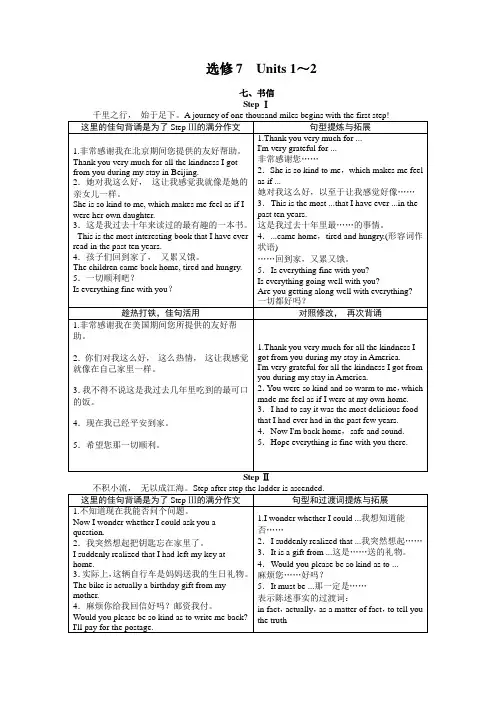
选修7Units 1~2七、书信Step Ⅰ千里之行,始于足下。
A journey of one thousand miles begins with the first step! 这里的佳句背诵是为了Step Ⅲ的满分作文句型提炼与拓展1.非常感谢我在北京期间您提供的友好帮助。
Thank you very much for all the kindness I got from you during my stay in Beijing.2.她对我这么好,这让我感觉我就像是她的亲女儿一样。
She is so kind to me, which makes me feel as if I were her own daughter.3.这是我过去十年来读过的最有趣的一本书。
This is the most interesting book that I have ever read in the past ten years.4.孩子们回到家了,又累又饿。
The children came back home, tired and hungry. 5.一切顺利吧?Is everything fine with you?1.Thank you very much for ...I'm very grateful for ...非常感谢您……2.She is so kind to me,which makes me feel as if ...她对我这么好,以至于让我感觉好像……3.This is the most ...that I have ever ...in the past ten years.这是我过去十年里最……的事情。
4....came home,tired and hungry.(形容词作状语)……回到家,又累又饿。
5.Is everything fine with you?Is everything going well with you?Are you getting along well with everything?一切都好吗?趁热打铁,佳句活用对照修改,再次背诵1.非常感谢我在美国期间您所提供的友好帮助。
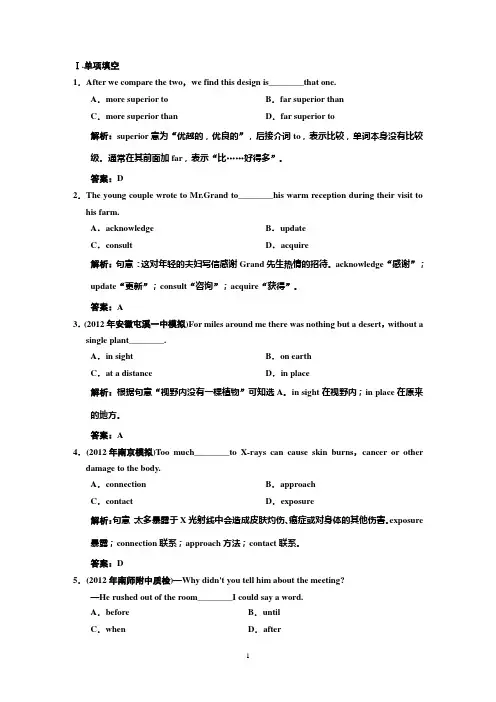
Ⅰ.单项填空1.After we compare the two,we find this design is________that one.A.more superior to B.far superior thanC.more superior than D.far superior to解析:superior意为“优越的,优良的”,后接介词to,表示比较,单词本身没有比较级。
通常在其前面加far,表示“比……好得多”。
答案:D2.The young couple wrote to Mr.Grand to________his warm reception during their visit to his farm.A.acknowledge B.updateC.consult D.acquire解析:句意:这对年轻的夫妇写信感谢Grand先生热情的招待。
acknowledge“感谢”;update“更新”;consult“咨询”;acquire“获得”。
答案:A3.(2012年安徽屯溪一中模拟)For miles around me there was nothing but a desert,without a single plant________.A.in sight B.on earthC.at a distance D.in place解析:根据句意“视野内没有一棵植物”可知选A。
in sight在视野内;in place在原来的地方。
答案:A4.(2012年南京模拟)Too much________to X-rays can cause skin burns,cancer or other damage to the body.A.connection B.approachC.contact D.exposure解析:句意:太多暴露于X光射线中会造成皮肤灼伤、癌症或对身体的其他伤害。
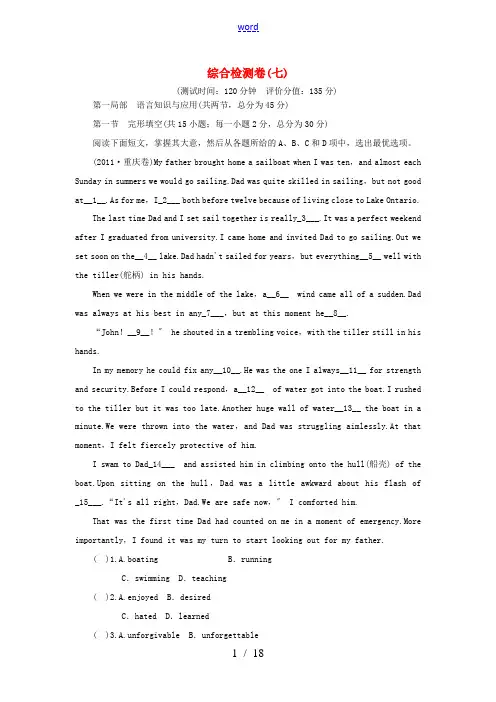
综合检测卷(七)(测试时间:120分钟评价分值:135分)第一局部语言知识与应用(共两节,总分为45分)第一节完形填空(共15小题;每一小题2分,总分为30分)阅读下面短文,掌握其大意,然后从各题所给的A、B、C和D项中,选出最优选项。
(2011·重庆卷)My father brought home a sailboat when I was ten,and almost each Sunday in summers we would go sailing.Dad was quite skilled in sailing,but not good at__1__.As for me,I_2___ both before twelve because of living close to Lake Ontario.The last time Dad and I set sail together is really_3___.It was a perfect weekend after I graduated from university.I came home and invited Dad to go sailing.Out we set soon on the__4__ lake.Dad hadn't sailed for years,but everything__5__ well with the tiller(舵柄) in his hands.When we were in the middle of the lake,a__6__ wind came all of a sudden.Dad was always at his best in any_7___,but at this moment he__8__.“John!__9__!〞 he shouted in a trembling voice,with the tiller still in his hands.In my memory he could fix any__10__.He was the one I always__11__ for strength and security.Before I could respond,a__12__ of water got into the boat.I rushed to the tiller but it was too late.Another huge wall of water__13__ the boat in a minute.We were thrown into the water,and Dad was struggling aimlessly.At that moment,I felt fiercely protective of him.I swam to Dad_14___ and assisted him in climbing onto the hull(船壳) of the boat.Upon sitting on the hull,Dad was a little awkward about his flash of _15___.“It's all right,Dad.We are safe now,〞 I comforted him.That was the first time Dad had counted on me in a moment of emergency.More importantly,I found it was my turn to start looking out for my father.( )1.A.boating B.runningC.swimming D.teaching( )2.A.enjoyed B.desiredC.hated D.learned( )3.A.unforgivable B.unforgettableC.cheerful D.regretful( )4.A.calm B.icyC.stormy D.thundery( )5.A.finished B.wentC.seemed D.sounded( )6.A.strong B.gentleC.cold D.hot( )7.A.danger B.placeC.sport D.job( )8.A.suffered B.fellC.froze D.withdrew( )9.A.Look B.HelpC.Run D.Jump( )10.A.problem B.relationshipC.machine D.boat( )11.A.turned to B.lived withC.argued with D.objected to( )12.A.fountain B.streamC.shower D.wave( )13.A.got through B.poured intoC.turned over D.lifted up( )14.A.hopelessly B.quicklyC.slowly D.helplessly( )15.A.pain B.angerC.fear D.shame第二节语法填空(共10小题;每一小题1.5分,总分为15分)阅读下面短文,按照句子结构的语法性和上下文连贯的要求,在空格处填入一个适当的词或使用括号中词语的正确形式填空,并将答案填写在相应位置上。
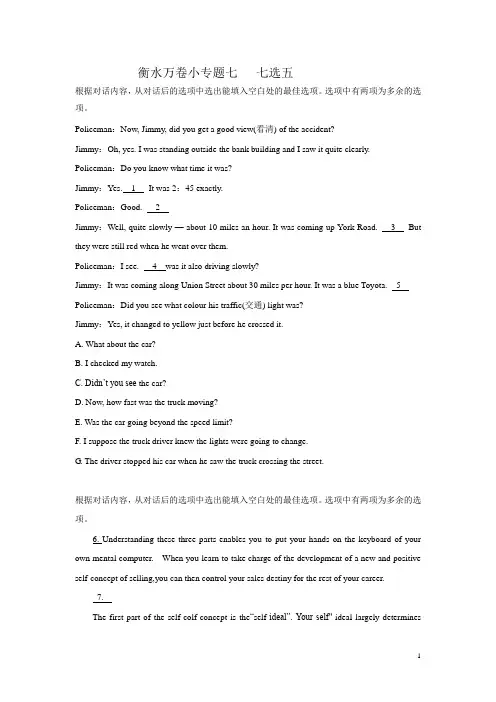
衡水万卷小专题七七选五根据对话内容,从对话后的选项中选出能填入空白处的最佳选项。
选项中有两项为多余的选项。
Policeman:Now, Jimmy, did you get a good view(看清) of the accident?Jimmy:Oh, yes. I was standing outside the bank building and I saw it quite clearly. Policeman:Do you know what time it was?Jimmy:Yes. 1 It was 2:45 exactly.Policeman:Good. 2Jimmy:Well, quite slowly — about 10 miles an hour. It was coming up York Road. 3 But they were still red when he went over them.Policeman:I see. 4 was it also driving slowly?Jimmy:It was coming along Union Street about 30 miles per hour. It was a blue Toyota. 5 Policeman:Did you see what colour his traffic(交通) light was?Jimmy:Yes, it changed to yellow just before he crossed it.A. What about the car?B. I checked my watch.C. Didn’t you see the car?D. Now, how fast was the truck moving?E. Was the car going beyond the speed limit?F. I suppose the truck driver knew the lights were going to change.G. The driver stopped his car when he saw the truck crossing the street.根据对话内容,从对话后的选项中选出能填入空白处的最佳选项。
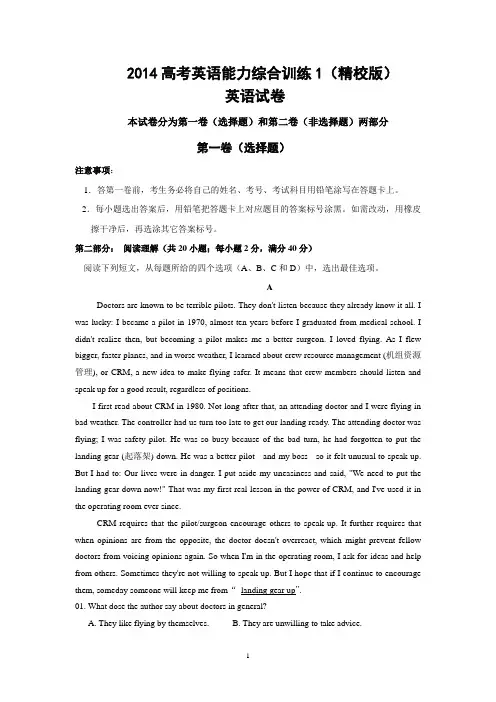
2014高考英语能力综合训练1(精校版)英语试卷本试卷分为第一卷(选择题)和第二卷(非选择题)两部分第一卷(选择题)注意事项:1.答第一卷前,考生务必将自己的姓名、考号、考试科目用铅笔涂写在答题卡上。
2.每小题选出答案后,用铅笔把答题卡上对应题目的答案标号涂黑。
如需改动,用橡皮擦干净后,再选涂其它答案标号。
第二部分:阅读理解(共20小题;每小题2分,满分40分)阅读下列短文,从每题所给的四个选项(A、B、C和D)中,选出最佳选项。
ADoctors are known to be terrible pilots. They don't listen because they already know it all. I was lucky: I became a pilot in 1970, almost ten years before I graduated from medical school. I didn't realize then, but becoming a pilot makes me a better surgeon. I loved flying. As I flew bigger, faster planes, and in worse weather, I learned about crew resource management (机组资源管理), or CRM, a new idea to make flying safer. It means that crew members should listen and speak up for a good result, regardless of positions.I first read about CRM in 1980. Not long after that, an attending doctor and I were flying in bad weather. The controller had us turn too late to get our landing ready. The attending doctor was flying; I was safety pilot. He was so busy because of the bad turn, he had forgotten to put the landing gear (起落架) down. He was a better pilot - and my boss - so it felt unusual to speak up. But I had to: Our lives were in danger. I put aside my uneasiness and said, "We need to put the landing gear down now!" That was my first real lesson in the power of CRM, and I've used it in the operating room ever since.CRM requires that the pilot/surgeon encourage others to speak up. It further requires that when opinions are from the opposite, the doctor doesn't overreact, which might prevent fellow doctors from voicing opinions again. So when I'm in the operating room, I ask for ideas and help from others. Sometimes they're not willing to speak up. But I hope that if I continue to encourage them, someday someone will keep me from“landing gear up”.01. What dose the author say about doctors in general?A. They like flying by themselves.B. They are unwilling to take advice.C. They pretend to be good pilots.D. They are quick learners of CRM.02. The author deepened his understanding of the power of CRM when_______.A. he saved the plane by speaking upB. he was in charge of a flying taskC. his boss landed the plane too lateD. his boss operated on a patient03. In the last paragraph “landing gear up” probably means ______.A. following flying requirements.B. overreacting to different opinions.C. listening to what fellow doctors sayD. making a mistake that may cost lives04. Which of the following can be the best title for the text?A.CRM: A New Way to Make Flying SafeB. Flying Makes Me a Better DoctorC. The Making of a Good PilotD. A Pilot-Turned DoctorE根据短文内容,从短文后的选项中选出能填入空白处的最佳选项,选项中有两项为多余选项。
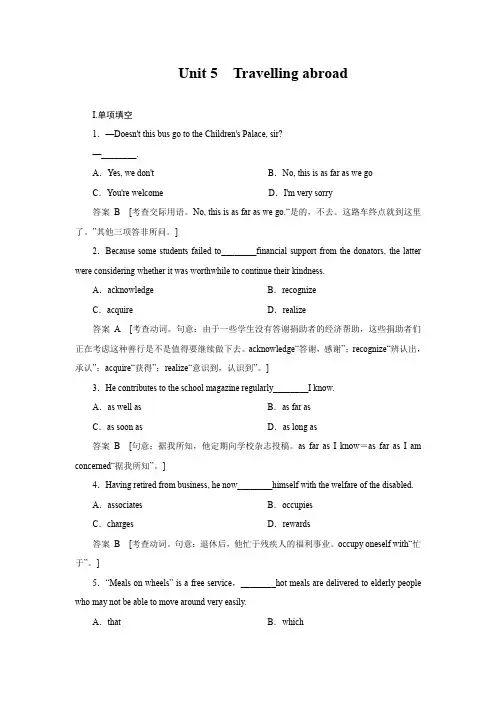
Unit 5Travelling abroadI.单项填空1.—Doesn't this bus go to the Children's Palace, sir?—________.A.Yes, we don't B.No, this is as far as we goC.You're welcome D.I'm very sorry答案B[考查交际用语。
No, this is as fa r as we go.“是的,不去。
这路车终点就到这里了。
”其他三项答非所问。
]2.Because some students failed to________financial support from the donators, the latter were considering whether it was worthwhile to continue their kindness.A.acknowledge B.recognizeC.acquire D.realize答案A[考查动词。
句意:由于一些学生没有答谢捐助者的经济帮助,这些捐助者们正在考虑这种善行是不是值得要继续做下去。
acknowledge“答谢,感谢”;recognize“辨认出,承认”;acquire“获得”;realize“意识到,认识到”。
]3.He contributes to the school magazine regularly________I know.A.as well as B.as far asC.as soon as D.as long as答案B[句意:据我所知,他定期向学校杂志投稿。
as far as I know=as far as I am concerned“据我所知”。
]4.Having retired from business, he now________himself with the welfare of the disabled.A.associates B.occupiesC.charges D.rewards答案B[考查动词。
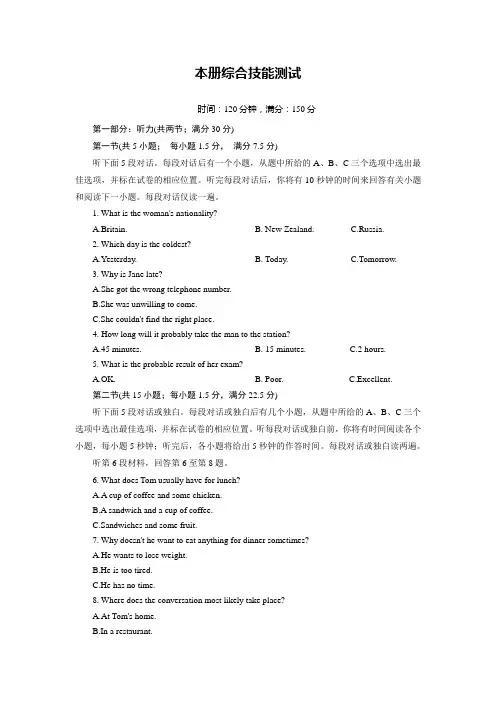
本册综合技能测试时间:120分钟,满分:150分第一部分:听力(共两节;满分30分)第一节(共5小题;每小题1.5分,满分7.5分)听下面5段对话。
每段对话后有一个小题,从题中所给的A、B、C三个选项中选出最佳选项,并标在试卷的相应位置。
听完每段对话后,你将有10秒钟的时间来回答有关小题和阅读下一小题。
每段对话仅读一遍。
1. What is the woman's nationality?A.Britain.B. New Zealand.C.Russia.2. Which day is the coldest?A.Yesterday.B. Today.C.Tomorrow.3. Why is Jane late?A.She got the wrong telephone number.B.She was unwilling to come.C.She couldn't find the right place.4. How long will it probably take the man to the station?A.45 minutes.B. 15 minutes.C.2 hours.5. What is the probable result of her exam?A.OK.B. Poor.C.Excellent.第二节(共15小题;每小题1.5分,满分22.5分)听下面5段对话或独白。
每段对话或独白后有几个小题,从题中所给的A、B、C三个选项中选出最佳选项,并标在试卷的相应位置。
听每段对话或独白前,你将有时间阅读各个小题,每小题5秒钟;听完后,各小题将给出5秒钟的作答时间。
每段对话或独白读两遍。
听第6段材料,回答第6至第8题。
6. What does Tom usually have for lunch?A.A cup of coffee and some chicken.B.A sandwich and a cup of coffee.C.Sandwiches and some fruit.7. Why doesn't he want to eat anything for dinner sometimes?A.He wants to lose weight.B.He is too tired.C.He has no time.8. Where does the conversation most likely take place?A.At Tom's home.B.In a restaurant.C.At the doctor's office.听第7段材料,回答第9至第11题。
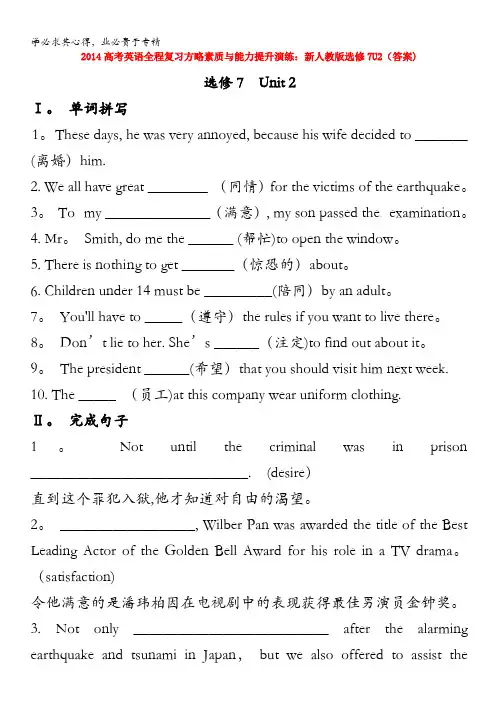
2014高考英语全程复习方略素质与能力提升演练:新人教版选修7U2(答案)选修7 Unit 2Ⅰ。
单词拼写1。
These days, he was very annoyed, because his wife decided to _______ (离婚)him.2. We all have great ________ (同情)for the victims of the earthquake。
3。
To my ______________(满意), my son passed the examination。
4. Mr。
Smith, do me the ______ (帮忙)to open the window。
5. There is nothing to get _______(惊恐的)about。
6. Children under 14 must be _________(陪同)by an adult。
7。
You'll have to _____(遵守)the rules if you want to live there。
8。
Don’t lie to her. She’s ______(注定)to find out about it。
9。
The president ______(希望)that you should visit him next week. 10. The _____ (员工)at this company wear uniform clothing.Ⅱ。
完成句子1。
Not until the criminal was in prison _____________________________. (desire)直到这个罪犯入狱,他才知道对自由的渴望。
2。
__________________, Wilber Pan was awarded the title of the Best Leading Actor of the Golden Bell Award for his role in a TV drama。
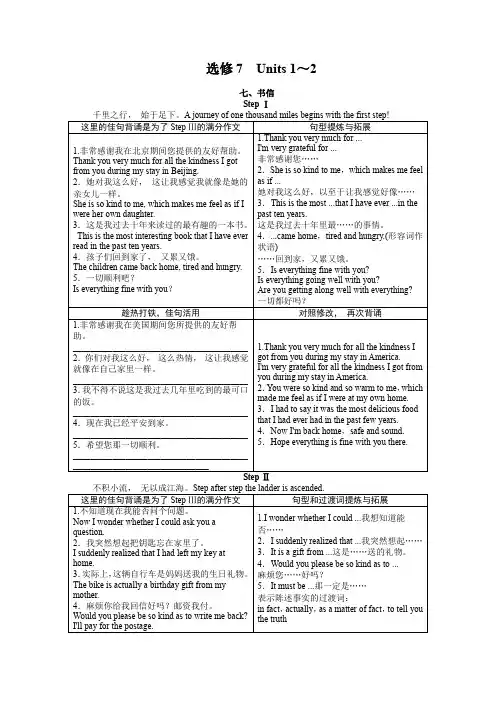
选修7Units 1~2七、书信Step Ⅰ千里之行,始于足下。
A journey of one thousand miles begins with the first step! 这里的佳句背诵是为了Step Ⅲ的满分作文句型提炼与拓展1.非常感谢我在北京期间您提供的友好帮助。
Thank you very much for all the kindness I got from you during my stay in Beijing.2.她对我这么好,这让我感觉我就像是她的亲女儿一样。
She is so kind to me, which makes me feel as if I were her own daughter.3.这是我过去十年来读过的最有趣的一本书。
This is the most interesting book that I have ever read in the past ten years.4.孩子们回到家了,又累又饿。
The children came back home, tired and hungry. 5.一切顺利吧?Is everything fine with you?1.Thank you very much for ...I'm very grateful for ...非常感谢您……2.She is so kind to me,which makes me feel as if ...她对我这么好,以至于让我感觉好像……3.This is the most ...that I have ever ...in the past ten years.这是我过去十年里最……的事情。
4....came home,tired and hungry.(形容词作状语)……回到家,又累又饿。
5.Is everything fine with you?Is everything going well with you?Are you getting along well with everything?一切都好吗?趁热打铁,佳句活用对照修改,再次背诵1.非常感谢我在美国期间您所提供的友好帮助。
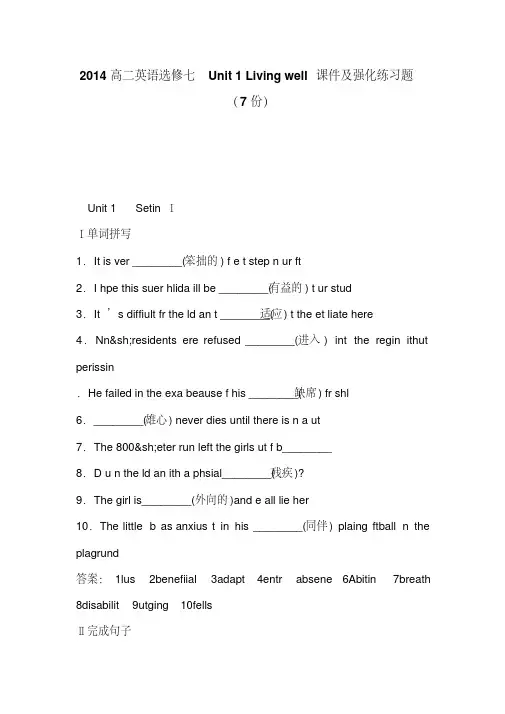
2014高二英语选修七Unit 1 Living well课件及强化练习题(7份)
Unit 1Setin ⅠⅠ单词拼写1.It is ver ________(笨拙的) f e t step n ur ft 2.I hpe this suer hlida ill be ________(有益的) t ur stud 3.It’s diffiult fr the ld an t ________(适应) t the et liate here 4.Nn&sh;residents ere refused ________(进入) int the regin ithut perissin .He failed in the exa beause f his ________(缺席) fr shl 6.________(雄心) never dies until there is n a ut 7.The 800&sh;eter run left the girls ut f b________ 8.D u n the ld an ith a phsial________(残疾)? 9.The girl is________(外向的)and e all lie her 10.The little b as anxius t in his ________(同伴) plaing ftball n the plagrund 答案:1lus2benefiial3adapt4entrabsene6Abitin7breath8disabilit9utging10fells Ⅱ完成句子1.我从报纸上剪下了这篇。I ________ this artile ________ ________ ________ ________ 2.他不但在这部影片中扮演角色,而且还导演了这部影片。He direted ________ ________ ________ ated in the fil 3.她写字漂亮,而且善于写。总之,她是一位好秘书。She has a gd handriting, and is gd at riting artiles ________ ________ ________,she is a qualified seretar 4.他听不懂女儿的话,因为她说得太快了。He ________ ________ ________ understanding his daughter as she spe s fast .他们两个正忙于做假花。T f the________ ________(忙于)aing artifiial flers 答案:1ut; ut f the nespaper2as ell as3All in all4had diffiult inere bus Ⅲ单项选择1.T be great, u ust be sart, nfident, and, ________,hnest A.therefreB.abve all .heverD.after all 答案:B考查副词及短语。句意:要想变得伟大,你必须是一个既聪明又有信心的人,最重要的是要诚实。therefre“因此”;abve all“最重要的是”;hever“然而”;after all“毕竟,终究”。2.Then, I a sure, hina ill be re perful than it is tda, and that ill be ________ rld peae A.disabled inB.lus t .benefiial tD.absent fr 答案:考查形容词辨析。句意:我可以肯定地说,中国将比今天更强大,这对世界和平会更加有利。A项“在某方面是残疾的”;B项“做(某事)是笨拙的”;项“有利于”;D项“缺席”。3.If u run ver fast, u a ________ ur breath A.hldB.tae .lseD.ut f 答案:考查breath的短语。句意:如果你跑得很快,你可能会喘不过气。hld ne’s breath“屏住呼吸”;tae ne’s breath“喘一口气”;lse ne’s breath“喘不过气”;ut f breath“上气不接下气”,是介词短语,前面需加系动词be才对。故答案选项。4.ur friend is ________ Des he ften ________ u? A.a great fun; ae funs f B.gd fun; ae fun f .ver funn; pla a e f D.fun; be laughed b 答案:B考查fun的用法。fun为不可数名词,表示“有趣的人或事物”;funn为形容词,表示“滑稽的;可笑的”。ae fun f为固定搭配,意思是“取笑”,相当于pla a e n。.The gd thing abut hildren is that the ________ ver easil t ne envirnents A.adaptB.appeal .attahD.appl 答案:A考查动词辨析。句意:孩子们好的地方是他们非常容易适应新环境。adapt t“适应”,符合句意。appeal t“吸引”;attah t“附属于”;appl t“向……申请”,均不符合题意。6.—h d u l s blue? —The squites ________e s uh that I uldn’t sleepA.punishedB.daaged .annedD.hurt 答案:考查动词辨析。句意:——“为什么你看起闷闷不乐呢?”——“蚊子搅得我无法入睡。”punish“惩罚”;daage“损坏”;ann“扰乱;使恼怒”;hurt“伤害”。由语境可知,项正确。7.—hen shall e g fr an uting? —________ u lie A.Ever tieB.Next tie .An tieD.The ent 答案:考查名词短语作连词的用法。四个选项均可以作连词引导时间状语从句,其中,an tie“任何时候”,符合句意。8.—hat d u thin f rs Sith? —She is ________ as u uld ever eet A.an as ind ladB.as a ind lad .as ind a ladD.ind as a lad 答案:考查“as as结构”。当形容词与名词连用时,其中的形容词必须放在冠词之前,构成“as+形容词+a(n)+名词+as”的结构,故选项。9.Zhang Hng is said________b heart 2000 rds up t n A.that he has learnedB.t have learned .t learnD.having learned 答案:Bsb is said“据说某人……”,后跟不定式,排除A、D两项;根据下“到目前已经记住了2000个单词”可知不定式所表示的动作发生在said之前,排除项。10.Her shes ________ her dress; the l ver ell tgether A.suitB.fit .pareD.ath 答案:D考查动词辨析。句意:她的鞋和她的裙子很匹配,搭配得很好。suit“(颜色、款式)适合”;fit“(尺寸、大小)合适”;pare“比较”;ath“相称、匹配”。Ⅳ完形填空阅读下面短,从短后所给各题的四个选项中,选出能填入空白处的最佳选项。He lst his ars in an aident that illed his father h as the ain sure f supprt fr the fail Sine then, he has had t __1__ the ars f his unger brther T l after hi, his unger brther never __2__ hi alne fr ears Exept fr riting ith his tes, he as pletel unable t d __3__ ne late night, he suffered fr diarrhea(腹泻) and had t __4__ his unger
原创精品资源学科网独家享有版权,侵权必究!1备战2018年高考英语人教选修7 单元能力提升测试卷·全解全析第一部分 阅读理解第一节A【语篇解读】这是一篇说明文,介绍了因为失误而发错信息的补救方法。
1. C 【解析】推理判断题。
根据第二段第二句You freeze in horror and burn with shame.可知选C 。
2. A 【解析】细节理解题。
根据第二个标题句Writing the wrong time 后面的内容Respond quickly and briefly,apologising for your mistake. Keep the tone measured: don’t handle it too lightl y, as people can be offended, especially if your error suggests a misunderstanding of their culture (i.e. incorrect ordering of Chinese names). 可知选A 。
学科&网3. D 【解析】细节理解题。
根据最后一段中的In that case, ask to speak in person as soon as possible and saysorry 可知选D 。
B【语篇解读】本文主要是说服读者购买书。
5. C 【解析】推理判断题。
由第一段可知这篇文章的主要对象是老师。
6. D 【解析】细节理解题。
根据最后一段中的"Remember, if you are not satisfied, just let us know and we willrefund you in full. You still get to keep the essential bonus material, yours for FREE "可知D 项正确。
2014届高考英语一轮复习单元测试Unit 1 Living with technology牛津版选修7第一节单项填空(共15 小题;每小题1分,满分15分)请认真阅读下面各题,从题中所给的A、B、C、D四个选项中,选出可以填入空白处的最佳选项,并在答题卡上将该项涂黑。
21. It can’t be denied that the Diaoyu Islands are ________ part of China and whatsome Japanese have done recently is actually ________ offence against Chinesepeople.A. a; /B. a; theC. the; /D. /; an22. Traffic conditions in Beijing ________ for decades. At first people onlycomplained about jams during rush hours,but today every hour is rush hour.A. is worseningB. have worsenedC. have been worseningD.worsened23. You might search on the internet for professors and their courses about this university ____ may interest you.A. whereB. thatC. whichD. who24. ––– Terribly sorry but I thought this was a parking lot.––– _______. Here is your ticket.A. That's all right.B. Never mind.C. Don’t mention it.D. Sorry, that is no excuse.25. Mo Yan's winning of 2012 Nobel Prize in Literature shows the world's ________of China's contemporary literature.A. recognitionB. intentionC. connectionD. application26. ---Will you go to the meeting for their discussion?---No, ______ invited. I don’t feel like getting involved with their business.A. unlessB. untilC. even ifD. otherwise27 "People of all walks of life are welcome to ________ the hope project," said theposter.A. subscribe toB. correspond toC. adjust toD.relate to.28. You are _____ to be disappointed if you hope to go to college without hard work.A. vagueB. boundC. eagerD. anxious29. ---It ______ be only two days before I have the job interview.---______ you succeed.A. must; MayB. must; ShouldC. will; MayD. will; Should30. With the development of economy, our country is becoming more and more powerful____ financial situation.A. on account ofB. in terms ofC. on behalf ofD. in place of31. Dear, I hope the engine will ______ until we get to the next garage.A. hold downB. hold outC. hold backD. hold up32. ________ on both sides of the street ________ excited fans who wanted to see the famous singing star.A. Standing; wasB. Waiting; wereC. Arriving; wasD.Living; wereA. privilegeB. reputationC. talentD. motivation33. ---What about your adventure in the forest last week?---Wonderful! I didn’t expect there ______ so many lovely monkeys.A. to beB. beingC. of beingD. be34. ––– It is ridiculous that John wants to make academic progress but neverdevotes any time to it.–––Maybe it’s time for him to know______.A. heaven never helps the man who will not actB. he who makes constant complaint gets little compassion.C. hope for the best, but prepare for the worstD. It is easy to be wise after the event.35. Bob could have seen the famous pop star ______ yesterday morning.A. did he comeB. if he cameC. had he comeD. if heshould come单选21-25 DCBDA 26-30 CABCB 31-35 BBAAC阅读下面短文,从短文后各题所给的四个选项(A、B、C和D)中,选出可以填入空白处的最佳选项,并在答题卡上将该项涂黑。
综合能力测试七(选修7) 时间:120分钟 满分:150分 第Ⅰ卷(共115分) 第一部分:听力(共两节,满分30分) 第一节:(共5小题;每小题1.5分,满分7.5分) 请听下面5段对话。每段对话后有一个小题,从题中所给的A、B、C三个选项中选出最佳选项,并标在试卷的相应位置。听完每段对话后,你都有10秒钟的时间来回答有关小题和阅读下一小题。每段对话仅读一遍。 1. How long has the man been waiting? A. For 20 minutes. B. For 60 minutes. C. For 70 minutes. 2. What does the woman mean? A. The performance was poor. B. She lost her watch last night. C. She was late for the performance. 3. What is the relationship between the speakers? A. Workmates. B. Classmates. C. Strangers. 4. Where is the man going now? A. To a restaurant. B. To the editor's office. C. To his own office. 5. Why is the man calling? A. To change his appointment. B. To speak to Dr Zane. C. To see the woman. 第二节:(共15小题;每小题1.5分,满分22.5分) 请听下面5段对话或独白。每段对话或独白后有几个小题,从题中所给的A、B、C三个选项中选出最佳选项,并标在试卷的相应位置。听每段对话或独白前,你将有时间阅读各个小题,每小题5秒钟;听完后,每小题将给出5秒钟的作答 时间。每段对话或独白读两遍。 请听第6段材料,回答第6至7题。 6. What does the man think of Abby's presentation? A. It is well organized. B. It is too long. C. It is well prepared. 7. What should Abby do to improve her presentation? A. Speak clearly. B. Be more confident. C. Avoid long pauses. 请听第7段材料,回答第8至9题。 8. Where was the woman born? A. In Australia. B. In the United States. C. In Chile. 9. How old was the man when he returned to the United States? A. 20. B. 17. C. 15. 请听第8段材料,回答第10至12题。 10. What is the conversation mainly about? A. Rights of animals. B. Tests on animals. C. Animal medicines. 11. How does the woman feel about the man's view? A. Delighted. B. Annoyed. C. Puzzled. 12. Why is the man unwilling to sign? A. He doesn't like animals at all. B. He doesn't think her view reasonable. C. He can't bear the woman talking like that. 请听第9段材料,回答第13至16题。 13. When will the visitors come? A. In March. B. In April. C. In May. 14. How many visitors are coming? A. 8. B. 6. C. 12. 15. What will the visitors do on the second day? A. Go to a party. B. Attend a lecture. C. Visit the schools. 16. What will the visitors do on the final day? A. Visit London. B. Walk along the coast. C. Visit Scotland. 请听第10段材料,回答第17至20题。 17. What did the writer do one day? A. He went to telephone his old friend. B. He paid a visit to his friend. C. He visited a friend and had lunch with him. 18. Which of the following is TRUE according to this story? A. The writer had not much difficulty in finding a parking place. B. It took him forty-five minutes to find a place to park his car. C. It was very difficult for the writer to find a parking place. 19. How did he look for his car? A. He asked a policeman for help. B. His friend called a policeman. C. He examined every car in the street. 20. What can we know from the passage? A. Traffic in the city is a headache. B. Driving in the city is a pleasure. C. It is joyful to find your car in the crowd. 听力部分录音材料 (Text 1) W:Sir, could you please wait for another 20 minutes and we'll serve you soon. M:Another 20 minutes? It was only 6 o'clock when I got here, but it's 7:10 now. (Text 2) M:So how was yesterday's performance? Did I miss out on anything good? W:Hardly, I kept looking at my watch the whole night. (Text 3) W:How wonderful to see you here! I wonder where you have been after graduation. M:I have been abroad for ten years. What about you? W:Me? Still in our college, I became a teacher. (Text 4) M:It's already 12:30. Let's go for lunch. W:Can you wait for me a few minutes? I'll be through with my report right away. M:I'm afraid I can't, because I have to go to the editor's office in half an hour. W:Then you go first. (Text 5) W:Good morning, Dr Zane's office. M:This is Mr Hill. I have a ten o'clock appointment, but I'm running a little late. Do you have any openings this afternoon? W:Sorry we don't. Can you come in tomorrow mor-ning? (Text 6) W:Now that Abby has finished her presentation, let's evaluate her speech. Jason, what do you think of her presentation? M:She spoke loudly and clearly and she seemed quite confident. W:OK. What else? M:Her speech was well organized. Her conclusion reminded me of all the important points she had made. W:Good. Now, what about some things that Abby might work on for next time? M:There were some long pauses when she was trying to think about what to say next. W:True. Perhaps practicing a few more times before her speech would help her not to pause as much. (Text 7) M:Hi. I don't think we've met. My name's Tom. W:Hi, Tom. Nice to meet you. My name is Juanita, but everybody calls me Jenny.